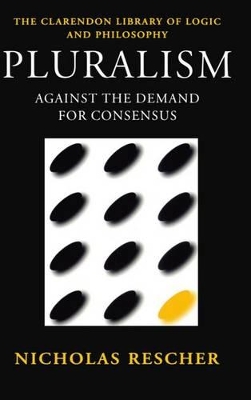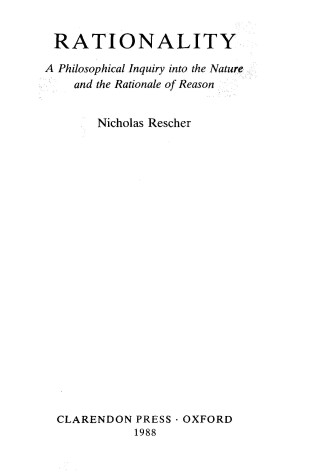Clarendon Library of Logic and Philosophy
2 total works
Nicholas Rescher presents a critical reaction against two currently influential tendencies of thought. On the one hand, he rejects the facile relativism that pervades contemporary social and academic life. On the other hand, he opposes the rationalism inherent in new-contractarian theory - both in the idealized communicative-contract version promoted in continental European political philosophy by Jurgen Habermas, and in the idealized social-contract version of the
theory promoted in the Anglo-American context by John Rawls.
Against such tendencies, Professor Rescher's pluralist approach takes a more realistic and pragmatic line, eschewing the convenient recourse of idealization in cognitive and practical matters. Instead of a utopianism that looks to a uniquely perfect order that would prevail under ideal conditions, he advocates incremental improvements within the framework or arrangements that none of us will deem perfect but that all of us 'can live with'. Such an approach replaces the yearning tor an
unattainable consensus with the institution of pragmatic arrangements in which the community will acquiesce - not through agreeing on their optimality, but through a shared recognition among the dissonant parties that the available options are even worse.
theory promoted in the Anglo-American context by John Rawls.
Against such tendencies, Professor Rescher's pluralist approach takes a more realistic and pragmatic line, eschewing the convenient recourse of idealization in cognitive and practical matters. Instead of a utopianism that looks to a uniquely perfect order that would prevail under ideal conditions, he advocates incremental improvements within the framework or arrangements that none of us will deem perfect but that all of us 'can live with'. Such an approach replaces the yearning tor an
unattainable consensus with the institution of pragmatic arrangements in which the community will acquiesce - not through agreeing on their optimality, but through a shared recognition among the dissonant parties that the available options are even worse.
This book aims to explain and defend the view that rationality consists in the intelligent pursuit of appropriate objectives, considering the mechanics of reason (what it is and how it works), the rationale of reason (why we should be rational) and rewards of reason (whether rational people are happier). The discussion seeks to clarify the workings of rationality and to provide a clear overview of this resource, whose possession differentiates "homo sapiens" from the remaining inhabitants of the earth. The central thesis is that only a "normative" theory of rationality can be adequate to the complexities of the subject. This means that the various social scientists - psychologists, economists and decision theorists who want on the one hand to present a theory of rationality while at the same time avoiding the vexing complexities of normative deliberations are engaged in a futile venture, being condemned from the outset to an inappropriate view of the rational enterprise.

